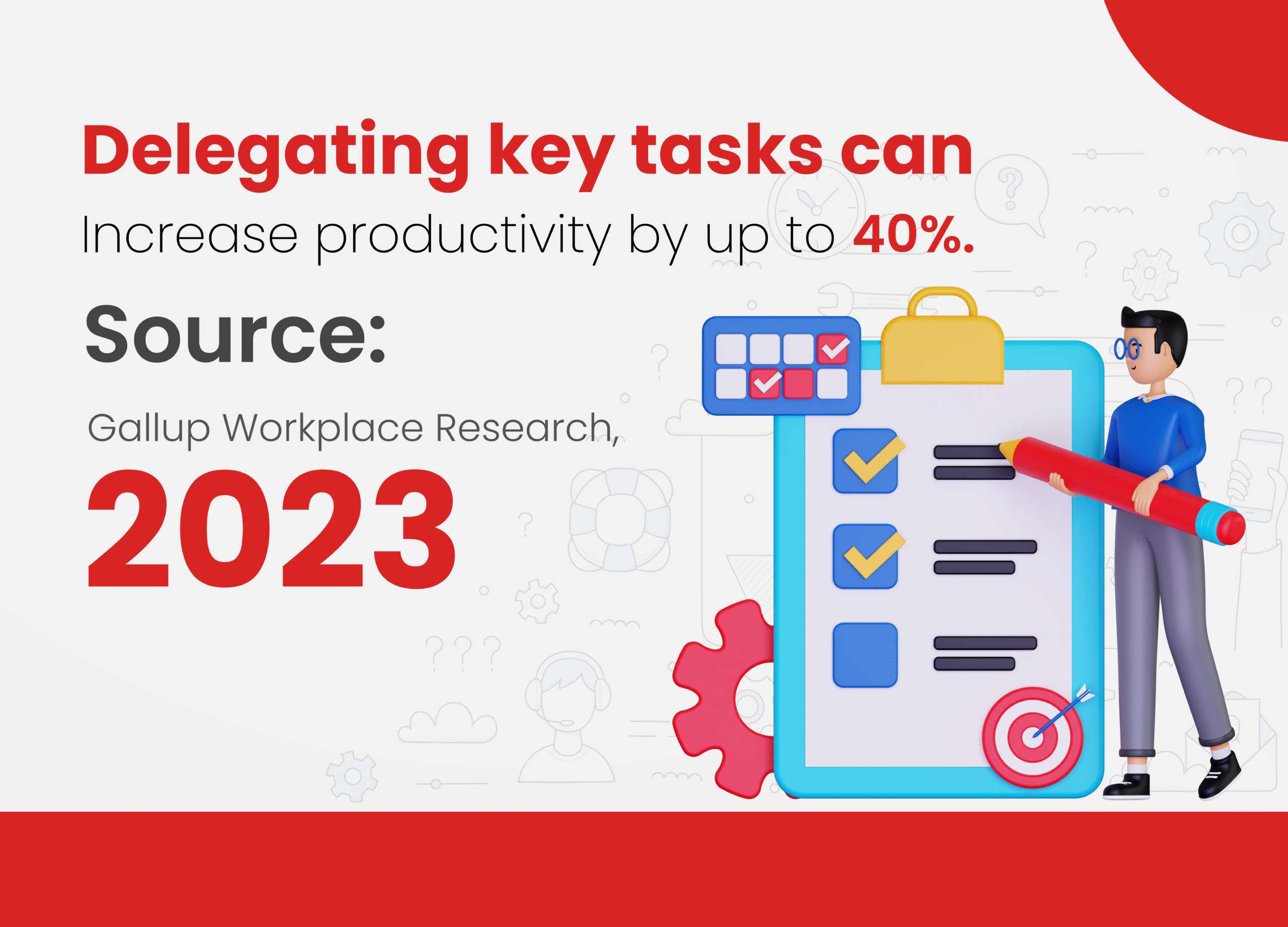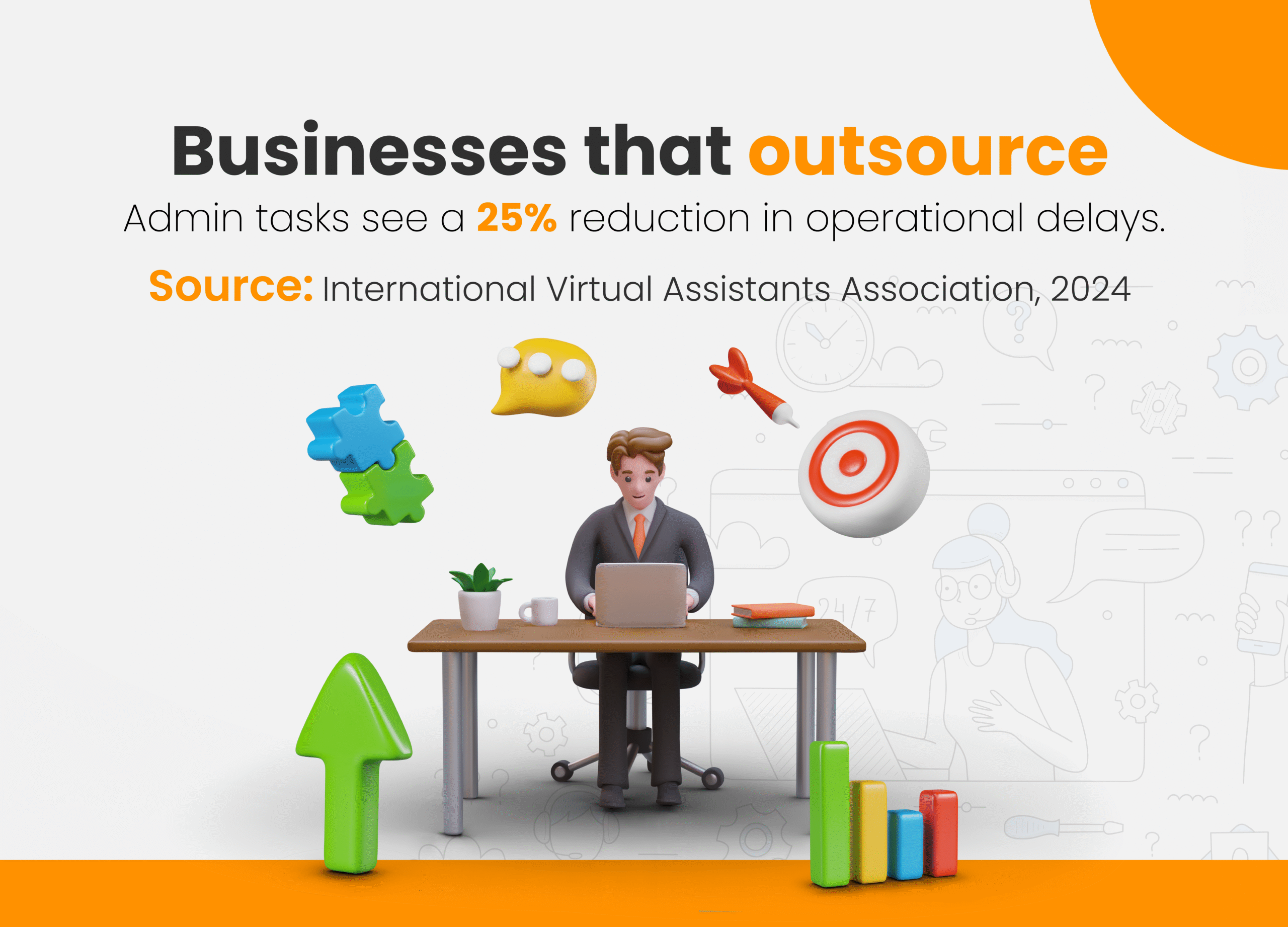Small business growth hinges on strategic action, not constant activity. Many entrepreneurs stretch themselves thin trying to handle every task alone. However, research shows that delegating key responsibilities can increase productivity by up to 40%. By focusing on high-impact tasks and outsourcing the rest, small business owners can achieve more with less effort.
This article explores 13 proven methods to grow your small business while reducing personal workload.
 Source: Gallup Workplace Research, 2023
Source: Gallup Workplace Research, 2023
1. Outsource Administrative Tasks to a Virtual Assistant
Hiring a virtual assistant for administrative work reduces daily stress and increases efficiency. Virtual assistants handle emails, scheduling, and data entry, freeing business owners to focus on strategic decisions. According to a Stanford study, remote workers—including virtual assistants—can improve productivity by up to 13%.
 Source: International Virtual Assistants Association, 2024
Source: International Virtual Assistants Association, 2024
By partnering with a virtual assistant service, small businesses gain access to experienced professionals without the overhead of hiring full-time staff.
2. Automate Marketing Campaigns
Marketing automation tools streamline email campaigns, social media posting, and customer engagement. These systems reduce manual effort while maintaining consistent communication with clients. HubSpot reports that companies using automation see a 451% increase in qualified leads.
With automation in place, entrepreneurs spend less time on repetitive marketing tasks and more time refining their business strategy.
 Source: HubSpot Marketing Statistics, 2024
Source: HubSpot Marketing Statistics, 2024
3. Delegate Customer Support to Remote Experts
Customer service is vital for small business success but often consumes excessive time. Outsourcing support to trained virtual agents ensures timely responses and higher satisfaction rates. Zendesk data shows that businesses with fast response times retain 70% more customers.
Training internal teams on customer service best practices takes time. In contrast, hiring pre-trained virtual assistants offers immediate results with minimal setup.
This method supports long-term growth by maintaining excellent service levels even during peak periods.
4. Use Templates for Repetitive Tasks
Creating templates for emails, invoices, contracts, and reports saves hours each week. Templates standardize communication and ensure consistency across client interactions. Small businesses that use templates save an average of 6 hours per week, according to a survey by DocuSign.
Utilizing digital tools like Canva and Google Docs makes it easy to design and store reusable content. This system minimizes errors and ensures team members follow the same format.
Templates empower small business owners to delegate tasks confidently, knowing quality remains consistent.
5. Focus on High-Value Activities Only
Not all tasks contribute equally to small business growth. Identifying and prioritizing high-value activities, such as networking, strategic planning, and client acquisition, ensures that time is invested wisely. McKinsey & Company found that leaders who focus on strategic work drive 20% higher growth than those who don’t.
 Source: McKinsey & Company, 2023
Source: McKinsey & Company, 2023
A focused approach enhances decision-making and long-term planning, leading to sustainable growth.
6. Bild Strategic Partnerships
Collaborations with complementary businesses open new customer channels and expand market reach. A Harvard Business Review case study revealed that small businesses with strong partnerships achieve 30% faster growth compared to those operating independently.
Strategic alliances position small businesses for scalable growth by leveraging shared expertise and expanding their audience.
7. Track Key Performance Indicators (KPIs)
Measuring progress through KPIs provides clarity on what’s working and what needs adjustment. Businesses that monitor key metrics, such as customer acquisition cost, lifetime value, and conversion rate, make better decisions and grow faster.
Tools like Google Analytics and QuickBooks offer real-time insights into financial health and marketing effectiveness.
These platforms highlight trends and inform data-driven choices.
Tracking KPIs keeps small business strategies aligned with growth objectives.
8. Invest in Employee Development
Training existing team members boosts productivity and reduces turnover. Gallup reports that employees who receive regular training are 4.6 times more engaged at work.
Developing skills internally builds a stronger, more adaptable workforce. It also fosters loyalty, reducing recruitment costs over time.
Skilled employees take on more responsibility, allowing business owners to focus on expansion rather than daily operations.
9. Set Clear Boundaries and Prioritize Self-Care
Burnout hinders small business growth. Founders who prioritize self-care and establish clear work-life boundaries tend to sustain higher energy and creativity. Entrepreneur magazine highlights that 72% of successful business owners credit balance as a key factor in long-term success.
Healthy entrepreneurs make better decisions, build stronger teams, and lead more effectively.
Self-care isn’t a luxury—it’s a strategic advantage for growing businesses.
10. Implement Scalable Systems
Scalable systems ensure smooth operations as a business grows. Standardized processes for onboarding, order fulfillment, and customer service reduce errors and inefficiencies. Companies with documented workflows grow 30% faster than those without, according to Inc. Magazine.
 Source: Inc. Magazine, 2023
Source: Inc. Magazine, 2023
Documenting procedures ensures consistency, especially when onboarding new employees or virtual assistants.
Scalable systems support long-term growth by minimizing friction during expansion phases.
11. Leverage Customer Feedback
Listening to customers helps refine products, services, and the overall experience. A Bright Local survey found that 88% of consumers trust online reviews as much as personal recommendations.
Collecting feedback through surveys, reviews, and direct communication reveals pain points and opportunities. Acting on this input builds trust and encourages repeat business.
Automated tools, such as SurveyMonkey and Type form, simplify feedback collection and analysis. A virtual assistant can manage this process and summarize findings.
12. Create Passive Income Streams
Passive income sources provide revenue with minimal ongoing effort. Examples include digital products, subscription services, or affiliate marketing. Forbes notes that small businesses with passive income streams enjoy greater financial stability.
Platforms like Gumroad and Teachable make it simple to launch and manage digital offerings. A virtual assistant can help with content creation, formatting, and promotion.
Diversifying income sources supports sustainable growth and reduces reliance on one-time sales.
13. Regularly Review and Refine Your Strategy
Small business growth strategies should evolve in response to changing market conditions and internal performance. Quarterly strategy reviews ensure alignment with long-term goals. Deloitte research indicates that organizations that reassess strategies annually grow 2.3 times faster than those that don’t.
Assigning a virtual assistant to gather relevant data streamlines the process. This proactive approach prevents stagnation and promotes agility.
Regular strategy refinement positions small businesses for continuous improvement and sustained success.
Conclusion: Grow Your Small Business by Focusing on What Matters Most
To achieve small business growth, entrepreneurs must shift from doing everything themselves to strategically delegating tasks.
The 13 methods outlined above—from outsourcing to automation and strategic planning—enable business owners to do more with less effort.
Hire a virtual assistant today and unlock new growth opportunities. With Virtual Mojoe, small business owners reclaim their time, boost productivity, and focus on what truly drives success.
For more insights on how to grow a small business efficiently, explore our other resources. Let us handle the routine so you can lead the way.




